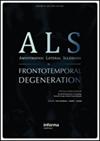Stage-specific riluzole effect in amyotrophic lateral sclerosis: a retrospective study
IF 2.5
4区 医学
Q2 CLINICAL NEUROLOGY
Amyotrophic Lateral Sclerosis and Frontotemporal Degeneration
Pub Date : 2020-01-02
DOI:10.1080/21678421.2019.1655060
引用次数: 16
Abstract
Abstract Objectives: To estimate the effect of riluzole on the stage-specific risk of progression of ALS. Methods: Patients from the PRO-ACT dataset were staged employing two methods (King's and FT9). Hazard ratios associated with riluzole treatment were estimated for forward transition between stages, using unadjusted and adjusted Markov multistate models. Results: Of 1903 patients, 1587 had received riluzole. Riluzole-treated patients survived non-significantly longer than those who did not (median 22.9 months vs. 18.3 months from time of initial observation, log rank p = 0.16). After adjusting for age and ALSFRS-R slope at first visit, riluzole significantly reduced risk of the following transitions: (1) King's stages: 1->2 (hazard ratio (HR) = 0.81), and 2->3 (HR = 0.82), 4->death (HR = 0.57), and (2) FT9 stages: 1->2 (HR = 0.84), 3->4 (HR = 0.71), and 4->death (HR = 0.67). In contrast, the beneficial effect of riluzole in bulbar-onset patients was in early rather than late King’s stages. Conclusions: This examination of cohorts closely followed in clinical trials finds a beneficial effect of riluzole that is predominantly but not exclusively in later stages of ALS. This analytic framework has utility to discern stage-specific treatment effects, and for refined health economic analyses.利鲁唑治疗肌萎缩性侧索硬化症的阶段性疗效:一项回顾性研究
摘要目的:评估利鲁唑对ALS分期风险的影响。方法:采用两种方法(King’s和FT9)对来自PRO-ACT数据集的患者进行分期。使用未经调整和调整的马尔可夫多状态模型,估计了与利鲁唑治疗相关的阶段间正向转换的风险比。结果:1903例患者中,1587例接受了利鲁唑治疗。接受利鲁唑治疗的患者存活时间与未接受利鲁佐治疗的患者相比无显著性差异(自首次观察时起,中位22.9个月vs.18.3个月,log秩p = 0.16)。在第一次就诊时调整了年龄和ALSFRS-R斜率后,利鲁唑显著降低了以下转变的风险:(1)King’s分期:1->2(危险比(HR)=0.81),2->3(HR=0.82),4->死亡(HR=0.57),和(2)FT9分期:1->2(HR=0.84),3->4(HR=0.71),4->死亡(HR0.67)。相反,利鲁唑对延髓发病患者的有益作用是在King’s早期而不是晚期。结论:这项对临床试验中密切关注的队列的检查发现,利鲁唑的有益作用主要但不限于ALS的晚期。该分析框架有助于识别特定阶段的治疗效果,并进行精细的健康经济分析。
本文章由计算机程序翻译,如有差异,请以英文原文为准。
求助全文
约1分钟内获得全文
求助全文
来源期刊

Amyotrophic Lateral Sclerosis and Frontotemporal Degeneration
CLINICAL NEUROLOGY-
CiteScore
5.40
自引率
10.70%
发文量
64
期刊介绍:
Amyotrophic Lateral Sclerosis and Frontotemporal Degeneration is an exciting new initiative. It represents a timely expansion of the journal Amyotrophic Lateral Sclerosis in response to the clinical, imaging pathological and genetic overlap between ALS and frontotemporal dementia. The expanded journal provides outstanding coverage of research in a wide range of issues related to motor neuron diseases, especially ALS (Lou Gehrig’s disease) and cognitive decline associated with frontotemporal degeneration. The journal also covers related disorders of the neuroaxis when relevant to these core conditions.
 求助内容:
求助内容: 应助结果提醒方式:
应助结果提醒方式:


